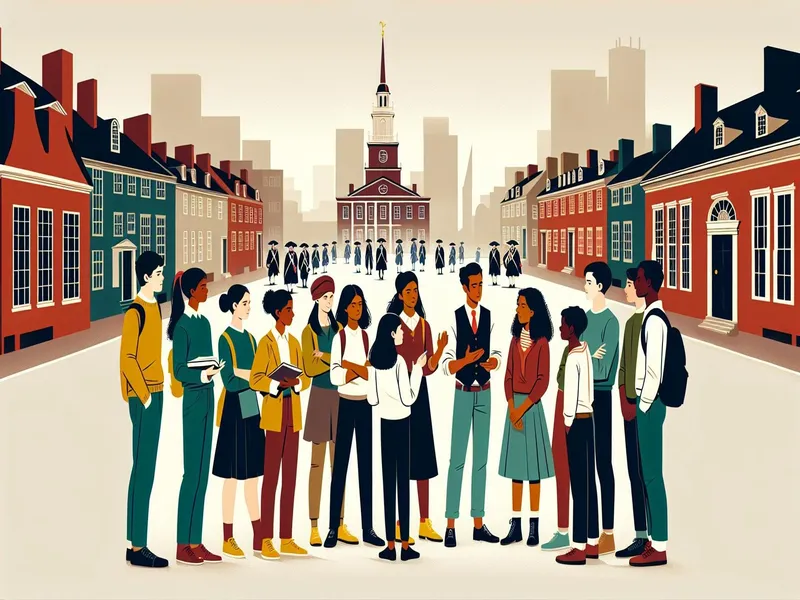
Whether you’re a history buff, an art lover, or someone eager to immerse yourself in new cultures, Europe’s rich world of experiences promises something for everyone.
But, missing out on these enriching opportunities can leave you with a sense of regret. Imagine visiting Rome without understanding the depth of its ancient ruins or touring Paris without grasping the significance of its iconic landmarks. Not addressing your need for meaningful travel experiences means losing out on deeper connections and insights.
With years of experience exploring Europe’s educational gems, I’ve uncovered countless ways to make your journey both informative and enjoyable. From guided museum tours to hands-on workshops, there’s no shortage of activities that cater to curious minds.
Different travelers have different needs—students might look for academic credit while families might seek kid-friendly learning activities. Tailoring your trip ensures it meets everyone’s expectations and makes the most out of every moment.
I understand how overwhelming planning such a trip can be. That’s why I’m here to guide you through it all, ensuring your European adventure is as educational as it is unforgettable. For more ideas on making your travels enriching, check out these travel activities.
Overview Of Educational Travel In Europe
Educational travel in Europe is like opening a treasure chest of history, art, and culture. It’s not just about visiting landmarks; it’s about immersing yourself in stories that textbooks can’t tell. Imagine wandering through the Colosseum in Rome where gladiators once fought or standing before the Mona Lisa in Paris’ Louvre Museum, feeling the weight of centuries-old artistry.
Types Of Experiences
You can find various educational experiences across Europe tailored to diverse interests:
- Historical Tours: Walkthroughs of ancient ruins and castles
- Art Workshops: Hands-on classes in famous art cities like Florence
- Language Immersion Programs: Intensive courses combined with local cultural activities
Benefits For Different Travelers
For students, these trips can be life-changing. Picture a high school history class exploring Berlin’s remnants of the Berlin Wall instead of just reading about it. Families can bond over shared discoveries, like trying traditional Spanish tapas after a day learning about Gaudí’s architecture in Barcelona.
Here are some benefits broken down by traveler type:
| Traveler Type | Benefits |
|---|---|
| Students | Real-world context for academic subjects |
| Families | Quality time together while learning |
| History Buffs | Deep dives into specific historical periods |
| Art Lovers | Direct access to masterpieces and creative classes |
Planning Tips
Planning an educational trip might seem daunting but trust me, it doesn’t have to be. Start by identifying what you want to learn or experience. Websites like TripAdvisor offer reviews on tours and attractions which can help narrow down choices.
A few tips:
- Research Local Guides: They know hidden gems and provide rich narratives.
- Mix Activities: Combine museum visits with interactive workshops.
- Timing Matters: Visit during off-peak seasons to avoid crowds.
When I went on my first educational trip, I realized how important it was to balance structured activities with free time. This flexibility allowed unexpected adventures—like stumbling upon a charming bookshop in Oxford.
Educational travel opens doors to new perspectives and profound understanding. Whether you’re tracing Shakespeare’s footsteps or decoding Viking runes, every journey offers unique lessons that stay with you long after you’ve returned home.
Top Destinations For Educational Travel

Europe offers a treasure trove of learning opportunities. From historical landmarks to cultural hubs and scientific wonders, there’s something for everyone.
Historical Sites
You can’t talk about educational travel without mentioning Europe’s rich history. Imagine standing where Julius Caesar once walked or exploring the ruins of ancient Greece.
- Rome, Italy: The Colosseum and Roman Forum bring ancient Rome to life.
- Athens, Greece: The Acropolis offers a glimpse into classical civilization.
- Berlin, Germany: Visit remnants of the Berlin Wall to grasp 20th-century history’s impact.
Each site immerses you in stories that textbooks can’t capture.
Cultural Centers
Cultural centers in Europe are like stepping into different worlds. They offer insights into art, music, and traditions that shape societies.
- Paris, France: The Louvre houses masterpieces like the Mona Lisa.
- Vienna, Austria: Known for its musical heritage with venues like the Vienna State Opera.
- Barcelona, Spain: Gaudí’s architectural marvels blend art with urban landscapes.
These places let you experience culture first-hand—no virtual tour can match that!
Scientific Landmarks
Scientific landmarks show how human curiosity has shaped our world. They’re perfect for budding scientists or anyone curious about innovation.
- CERN, Switzerland: Home to the Large Hadron Collider; it’s a playground for physicists.
- Galileo Museum, Italy: Located in Florence; discover Galileo’s contributions to astronomy and physics.
- Royal Observatory Greenwich, UK: Learn about timekeeping and stand on the Prime Meridian line.
Educational Travel Programs And Tours

Exploring Europe through educational travel programs and tours offers a unique way to learn while having an adventure. Here’s a look at some of the standout options.
University-Sponsored Programs
University-sponsored programs often offer rich, immersive experiences. These trips are great for students looking to earn academic credits while exploring new cultures. For example, I once joined a program from my university that took us to study Renaissance art in Florence. We had access to museums after hours and even got to meet local artists.
These programs typically include:
- Academic Credit: Earn credits toward your degree.
- Guided Learning: Professors lead tours and discussions.
- Special Access: Entry to places not open to the general public.
Universities partner with institutions abroad, ensuring you get an authentic learning experience without the stress of planning every detail yourself.
Private Educational Tours
Private educational tours are perfect if you’re looking for flexibility and personalized attention. These tours can be customized based on your interests—whether it’s history, art, or science. I remember booking a private tour focused on WWII history across Germany and Poland; it was eye-opening and deeply personal.
Benefits include:
- Customization: Tailor the itinerary to suit your interests.
- Expert Guides: Local experts provide in-depth knowledge.
- Small Groups: More interaction with guides and fellow travelers.
One memorable aspect was our guide’s anecdote about his grandfather’s experiences during the war—something you’d never find in textbooks. If you prefer a more intimate setting for learning, private tours are definitely worth considering.
Benefits Of Educational Travel In Europe
Educational travel in Europe offers a unique blend of learning and adventure. By exploring historical sites, engaging in hands-on activities, and meeting new people, travelers can gain insights that textbooks can’t provide. Let’s jump into some key benefits.
Cultural Immersion
Cultural immersion is one of the standout benefits of educational travel in Europe. You get to experience traditions and daily life firsthand. Imagine walking through Rome’s ancient streets or enjoying a traditional Spanish flamenco show in Seville. These experiences create lasting memories and deepen your understanding of different cultures. For example, when I visited Germany during Oktoberfest, I didn’t just witness the festivities; I participated alongside locals, sharing laughs and stories over giant pretzels and beer steins. It’s these kinds of immersive moments that truly bring history and culture to life.
Hands-On Learning
Hands-on learning transforms abstract concepts into tangible experiences. Whether you’re trying your hand at pottery in Greece or participating in a cooking class in Italy, these activities make learning fun and memorable. When I attended an art restoration workshop in Florence, I not only learned about Renaissance techniques but also got to restore a piece myself—talk about feeling like Michelangelo for a day! These practical lessons stick with you much longer than theoretical ones because you’re actively engaged.
Networking Opportunities
Networking opportunities are another significant perk of educational travel. Meeting people from different backgrounds broadens your perspective and can lead to lifelong friendships or professional connections. During my trip to CERN in Switzerland, I met budding scientists from around the world who shared my passion for physics. We exchanged ideas over coffee breaks between lectures on particle acceleration—fascinating stuff! Such interactions enrich your journey by introducing you to diverse viewpoints and potential collaborators.
These benefits collectively make educational travel an enriching experience that goes beyond mere sightseeing—it’s about living the lessons you learn along the way.
Tips For Planning An Educational Trip
Planning an educational trip to Europe can be thrilling but also a bit daunting. Let’s jump into some practical tips that can make your planning process smooth and enjoyable.
Budgeting And Funding
Budgeting is probably the least glamorous part of planning, but it’s essential. Start by setting a realistic budget for flights, accommodations, food, and activities. Websites like Skyscanner help find affordable flight options. Don’t forget hidden costs like transportation within cities or entrance fees to museums.
Consider looking into grants or scholarships if you’re traveling as a student. Some universities offer funding for educational trips. Crowdfunding platforms like GoFundMe have helped many travelers gather necessary funds through community support.
Pro tip: Always set aside a small emergency fund—unexpected expenses are almost guaranteed!
Safety Considerations
Safety should always be top of mind when traveling abroad, especially on educational trips where the focus might shift away from everyday concerns. Make copies of important documents like passports and insurance cards; store them separately from the originals.
Check travel advisories on websites like the U.S. Department of State before you leave, and register with STEP (Smart Traveler Enrollment Program) so that embassies can assist in emergencies.
Personal Anecdote: I once lost my passport while rushing between museums in Paris—having a scanned copy saved me tons of stress at the embassy.
Itinerary Optimization
Creating an optimized itinerary ensures you get the most out of your trip without feeling overwhelmed. Mix structured activities with free time for spontaneous adventures—you never know what hidden gems you’ll stumble upon!
Prioritize must-see sites first but leave gaps for rest and exploration. Use apps like Google Trips or TripIt to organize your schedule digitally; they even send reminders about reservations or tours you’ve booked.
Hypothetical Scenario: Imagine you’re touring Rome’s historical sites—you’d want enough time at each landmark without having to rush through them just because you overpacked your day’s agenda.
In Closing
Educational travel in Europe offers an unparalleled blend of learning and adventure. Each journey is a chance to dive deep into history, art, and culture, creating memories that textbooks alone can’t provide. Whether you’re exploring ancient ruins or attending hands-on workshops, the experiences are transformative.
I’ve found that tailoring trips to individual interests maximizes their impact. A well-planned itinerary can balance structured activities with free time for unexpected discoveries, enhancing the overall experience. From personal anecdotes to practical tips planning these adventures has been incredibly rewarding.
Eventually educational travel enriches our understanding of the world. It opens doors to new perspectives and lifelong lessons making every trip a valuable investment in personal growth and knowledge.